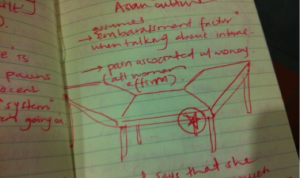The realization that qualitative research produced within a subject/observer framework is inherently flawed has been a long time coming in academic circles. Yet we are still just now acknowledging the power of academic text, which often attributes motive and meaning to the actions observed, constructing an ‘event’ out of daily life, while inconspicuously failing to recognize the presence and influence of the viewer (Smith 1988). Scenes such as an adult immigrant pre-employment class are painted through the rose-colored glasses of the privileged viewer. The written work that this viewer then produces is presented to readers as an objective perspective on ‘real’ life, when in fact such a depiction constitutes what Donna Haraway calls ‘the God trick’ —the act of appearing to see everything from nowhere in particular, which, of course, is physically impossible. Feminist sociologists now posit that the only way in which significant qualitative work can be produced is through active participation in the material social practices of everyday life—and a subsequent production of narratives of personal consciousness, which can then be compared to those belonging to others (Smith 1988).
In my time at Frog Hollow for example, while participating in a pre-employment program for Spanish mothers which focused on financial literacy, I happened to sketch the table around which we were all seated, facing the instructor, Billy Sinclair. I have included this sketch below in Figure 1, adding a circled star to indicate where I was sitting. Encouraged by the instructor and the Frog Hollow facilitator, Lea Laberge,the other IVEFS students and I participated in the class by contributing our financial questions to the list posted on the wall. The act of adding questions to the wall, while all sitting around the same table, and sharing personal stories along with the women, symbolized participation in the active creation of the material and social environment of the class. The photo above (from my field notes) is simply a representation of my physical position, which I can use to remind myself that while I may have understood the class from a certain personal standpoint, others may have their own standpoints, stemming both from the seating arrangement and from their social status.
While personal narratives of everyday life are valuable, in order to produce knowledge some analysis must be done. Through my active participation in my field site I am able to then compare the notes that describe my personal experiences, thoughts, questions with others. Instead of objectifying the other participants, feminist methodology empowers its subjects by allowing them the agency to experience their own consciousness, unaffected by the researcher, which later can be analyzed to understand the larger power structures at work.
Although my experience participating in the group was probably tainted by having my notebook out instead of devoting the entirety of my attention to the class, in other ways I did my best not to allow my role to become that of a ‘researcher’ observing subjects in their ‘natural habitat, rather, I was, just as everyone there was, eager to learn about money management. I did however diligently record that which permeated my consciousness that morning—which now rests of the pages of my notebook as a series of jokes, interspersed with questions, financial advice, etc. all of which speak directly to my experiences that day, but can be used in the future to attempt produce a feminist sociology of adult immigration classes at Frog Hollow Neighborhood House.
Work Cited
Smith, Dorothy E. The Everyday World as Problematic: A Feminist Sociology. Boston: Northeastern UP, 1988.

